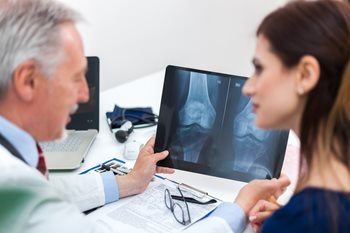Women and Osteoporosis

If your physician has told you that you have low bone mass or osteoporosis, you may be at an increased risk of fracture of your hip, spine or wrist. Osteoporosis is most common in women after menopause, but is not solely a women’s health concern. Low bone mass and osteoporosis may also be a result of another chronic health concern, such as parathyroid disease, or of medications to treat other health issues.
Risk Factors are characteristics or conditions that make a person more susceptible to developing a particular disease. You can control or change some risk factors by making better lifestyle choices, while others cannot be changed.
You are at an elevated risk of low bone mass or osteoporosis if you have any of the following
Risk factors that can’t be changed
- Female
- Older age
- Family history of osteoporosis or a have broken a bone
- Asian or Caucasian
- Small, thin frame
Risk factors you have more control over:
- Diet low in calcium, vitamin D, or high in sodium, calcium or protein
- Inactive lifestyle
- Smoking
- Excessive alcohol intake (women: >1 drink per day; men >2 drinks per day)
There are steps that you can take to help support your bones and prevent osteoporosis. Talk with your primary care physician about whether a bone density test is right for you and for guidance on the following:
- Diet: get the recommended amount of calcium and vitamin D for your age
- Physical Activity – the surgeon general recommends weight bearing physical activity for 30 minutes/day on five or more days/week. If you have never exercised, talk with your physician about getting started; he or she may recommend that you consult with a physical therapist or fitness instructor
- If you smoke, please quit. If you don’t smoke, don’t start and avoid second hand smoke.
- Limit your alcohol use
- Medications:
- If you take medications for other health issues, ask your physician if they may affect bone health.
- If your physician prescribes medications to treat osteoporosis, talk to him or her about how to take them appropriately.
Reference Links:
Other orthopedic concerns: Refer to links below if you are making decisions for yourself or a family member related to a sports injury or total joint replacement.